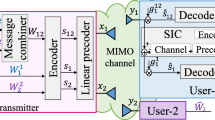Abstract
An important objective of next-generation wireless networks is to provide quality of service (QoS) guarantees. This requires a simple and efficient wireless channel model that can easily translate into connection-level QoS measures such as data rate, delay and delay-violation probability. To achieve this, in Wu and Negi (IEEE Trans. on Wireless Communications 2(4) (2003) 630–643), we developed a link-layer channel model termed effective capacity, for the setting of a single hop, constant-bit-rate arrivals, fluid traffic, and wireless channels with negligible propagation delay. In this paper, we apply the effective capacity technique to deriving QoS measures for more general situations, namely, (1) networks with multiple wireless links, (2) variable-bit-rate sources, (3) packetized traffic, and (4) wireless channels with non-negligible propagation delay.
Similar content being viewed by others
References
C.-S. Chang, Performance Guarantees in Communication Networks (Springer, 2000).
R.L. Cruz, A calculus for network delay, Part I: network elements in isolation, IEEE Trans. on Information Theory 37(1) 114–131 (1991).
G. de Veciana and J. Walrand, Effective bandwidths: Call admission, traffic policing and filtering for ATM networks, Queuing Systems 20 (1995) 37–59.
H. Holma and A. Toskala, WCDMA for UMTS: Radio Access for Third Generation Mobile Communications (Wiley, 2000).
J.-Y. Le Boudec and P. Thiran, Network Calculus: A Theory of Deterministic Queueing Systems for the Internet (Springer, 2001).
R.M. Loynes, The stability of a queue with non-independent inter-arrivals and service times, Proc. Camb. Phil. Soc. 58 (1962) 497–520.
A.K. Parekh and R.G. Gallager, A generalized processor sharing approach to flow control in integrated services networks: the single node case, IEEE/ACM Trans. on Networking 1(3) (1993) 344–357.
D. Wu and R. Negi, Effective capacity: a wireless link model for support of quality of service, IEEE Trans. on Wireless Communications 2(4) (2003) 630–643.
D. Wu, Providing quality of service guarantees in wireless networks, Ph.D. Dissertation, Dept. of Electrical & Computer Engineering, Carnegie Mellon University (Aug. 2003). Available at http://www.wu.ece.ufl.edu/mypapers/Thesis.pdf
Z.-L. Zhang, End-to-end support for statistical quality-of-service guarantees in multimedia networks, Ph.D. Dissertation, Department of Computer Science, University of Massachusetts (Feb.1997).
Author information
Authors and Affiliations
Corresponding author
Additional information
Dapeng Wu received B.E. in Electrical Engineering from Huazhong University of Science and Technology, Wuhan, China, in 1990, M.E. in Electrical Engineering from Beijing University of Posts and Telecommunications, Beijing, China, in 1997, and Ph.D. in Electrical and Computer Engineering from Carnegie Mellon University, Pittsburgh, PA, in 2003. From July 1997 to December 1999, he conducted graduate research at Polytechnic University, Brooklyn, New York. During the summers of 1998, 1999 and 2000, he conducted research at Fujitsu Laboratories of America, Sunnyvale, California, on architectures and traffic management algorithms in the Internet and wireless networks for multimedia applications.
Since August 2003, he has been with Electrical and Computer Engineering Department at University of Florida, Gainesville, FL, as an Assistant Professor. His research interests are in the areas of networking, communications, multimedia, signal processing, and information and network security. He received the IEEE Circuits and Systems for Video Technology (CSVT) Transactions Best Paper Award for Year 2001.
Currently, he is an Associate Editor for the IEEE Transactions on Vehicular Technology and Associate Editor for International Journal of Ad Hoc and Ubiquitous Computing. He served as Program Chair for IEEE/ACM First International Workshop on Broadband Wireless Services and Applications (BroadWISE 2004); and as TPC member of over 20 conferences such as IEEE INFOCOM'05, IEEE ICC'05, IEEE WCNC'05, and IEEE Globecom'04. He is Vice Chair of Mobile and wireless multimedia Interest Group (MobIG), Technical Committee on Multimedia Communications, IEEE Communications Society. He is a member of the Award Committee, Technical Committee on Multimedia Communications, IEEE Communications Society. He is also Director of Communications, IEEE Gainesville Section.
Rohit Negi received the B.Tech. degree in Electrical Engineering from the Indian Institute of Technology, Bombay, India in 1995. He received the M.S. and Ph.D. degrees from Stanford University, CA, USA, in 1996 and 2000 respectively, both in Electrical Engineering. He has received the President of India Gold medal in 1995.
Since 2000, he has been with the Electrical and Computer Engineering department at Carnegie Mellon University, Pittsburgh, PA, USA, where he is an Assistant Professor. His research interests include signal processing, coding for communications systems, information theory, networking, cross-layer optimization and sensor networks.
Rights and permissions
About this article
Cite this article
Wu, D., Negi, R. Effective Capacity-Based Quality of Service Measures for Wireless Networks. Mobile Netw Appl 11, 91–99 (2006). https://doi.org/10.1007/s11036-005-4463-3
Published:
Issue Date:
DOI: https://doi.org/10.1007/s11036-005-4463-3




